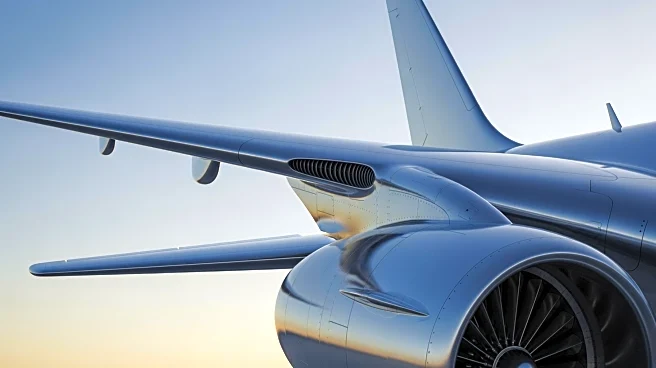What's Happening?
Boeing is progressing to the next stage of flight testing for its 777X program, despite recent delays in certification. The company has received clearance from the Federal Aviation Administration (FAA)
to begin the Type Inspection Authorization Phase 3. This phase will focus on avionics and systems testing over the coming months. Boeing Commercial Airplanes President and CEO Stephanie Pope expressed disappointment over the delays but emphasized transparency with customers. The 777-9, the first model in the 777X series, is now expected to be delivered in 2027, seven years later than initially planned. Emirates President Tim Clark expressed surprise at the delay, highlighting the impact on future operators. The first 777-9 development aircraft, WH001, is currently on display at the Dubai Airshow, where further testing will be conducted.
Why It's Important?
The delay in the 777X program affects several major airlines that have been anticipating the aircraft's delivery. The 777X is designed to offer improved fuel efficiency and passenger capacity, making it a critical component for airlines looking to modernize their fleets. The delay could impact airlines' operational plans and financial projections, as they may need to rely on older, less efficient aircraft longer than expected. Boeing's commitment to transparency and customer communication is crucial to maintaining trust and managing expectations. The advancement to the next testing phase indicates progress, but the extended timeline underscores challenges in aircraft certification processes.
What's Next?
Boeing will continue with the FAA's Type Inspection Authorization Phase 3, focusing on avionics and systems testing. The company plans to conduct stability and control testing, along with updates to the aircraft's fly-by-wire flight control system. These steps are essential for meeting certification requirements and ensuring the aircraft's readiness for commercial service. Airlines and industry stakeholders will be closely monitoring Boeing's progress, as further delays could necessitate adjustments in fleet management and strategic planning. Boeing's efforts to enhance communication with customers will be critical in navigating the extended timeline.
Beyond the Headlines
The delays in the 777X program highlight broader challenges in the aerospace industry, including regulatory hurdles and technological complexities. The situation underscores the importance of robust testing and certification processes to ensure safety and reliability. It also reflects the competitive pressures faced by manufacturers to deliver advanced aircraft that meet evolving market demands. The transparency and communication strategies employed by Boeing may set a precedent for how aerospace companies manage customer relations during development setbacks.











